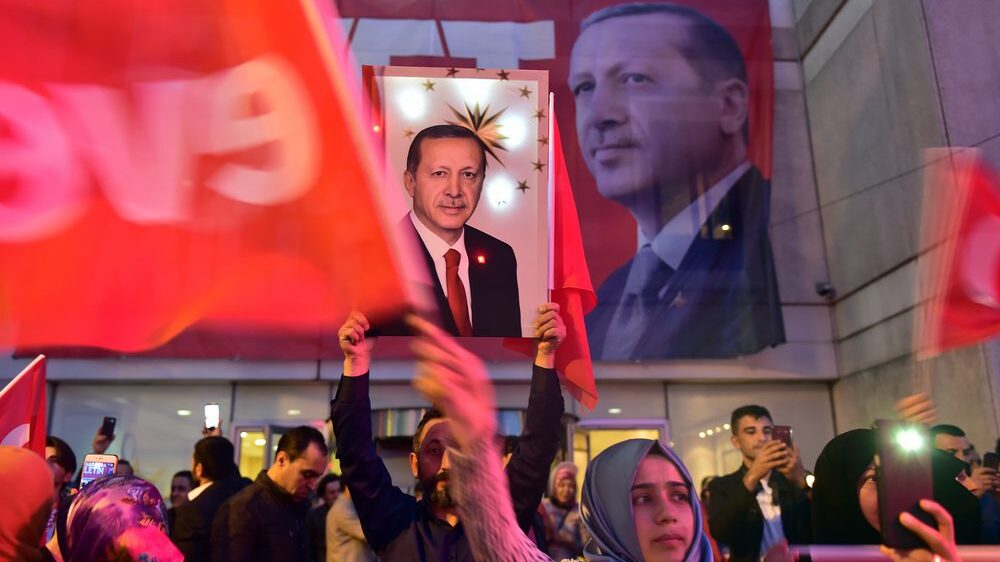
Photo: thomas koch / Shutterstock.com
Incumbent President Recep Tayyip Erdoğan and his People’s Alliance won the first round of Turkey’s presidential elections with 49.4% of the votes on Sunday, May 14th, just shy of reaching the 50% threshold needed to secure victory outright. This means he will have to face off against his strongest opponent, Kemal Kılıçdaroğlu (who scored 44.9%) in the presidential runoff election scheduled for May 28th.
Favored by most national polls before the election, Kılıçdaroğlu appears to have underestimated Erdoğan’s popularity. Although the former physics teacher promising a democratic realignment in both domestic and international policies did manage to win in almost all major population centers—including Istanbul and Ankara—the overall numbers tipped the scale in favor of the incumbent president, who has been leading the country for two decades.
“Some people are in the kitchen, we are on the balcony,” Erdoğan celebrated in front of his supporters from his party headquarters, mocking Kılıçdaroğlu who filmed his campaign videos from his own kitchen.
Nonetheless, the opposition leader is confident that the runoffs will deliver him and his National Alliance the much-needed edge to initiate a regime change and the reforms he promised with it.
“We will definitely win this election in the second round,” Kılıçdaroğlu said as the results were still coming in on Sunday night. “Erdoğan didn’t win the vote of confidence he was expecting. … In the next fifteen days, we will fight for rights, laws, and justice in this country.”
But while politics are often about big words and showmanship, runoff elections are usually just a numbers game, with all eyes focused on those voters who cast their ballots for third candidates. With Muharrem İnce of the center-left Homeland Party quitting the race merely days before the first round, only one potential kingmaker remained: Sinan Oğan, leading the smaller, nationalist ATA Alliance, scoring 5.2% on Sunday.
The formula seems simple enough: if Kılıçdaroğlu manages to recruit nearly all of Oğan’s voters under his banner before the end of the month, then he may stand a chance. But if Erdoğan scoops up even half of those votes, the National Alliance will have a very hard time defeating him, as it would need to turn some of Erdoğan’s own voter base instead.
And there lies the problem. Although Oğan’s was still a clear-cut opposition campaign, his policies and positions fall closer to the incumbent president than to his main challenger. As a former member of the Erdoğan-allied Nationalist Movement Party (MHP), Oğan is known for having a strong stance on the Kurdish question, which could easily ruin any prospects of endorsing Kılıçdaroğlu, since the NA relies heavily on the support of the pro-Kurdish HDP party.
“Turkish nationalists … are in a key position for this election,” Oğan said on Sunday, referring to his party’s important role in potentially deciding the outcome.
However, he offered no official endorsement yet, as everything is still up for negotiations—even if the terms do not seem to favor the National Alliance. “I’ll only support Kılıçdaroğlu if the HDP [the People’s Democratic Party] is excluded from the political system,” Oğan stated before, which means NA is looking towards quite an uphill battle.
Furthermore, the results of the parliamentary elections which took place simultaneously might also strengthen Erdoğan’s bid instead of Kılıçdaroğlu’s. With 35.5% of the votes, Erdoğan’s Justice and Development Party (AKP) undoubtedly won the race, securing 266 seats in the Grand National Assembly. Kılıçdaroğlu’s Republican People’s Party (CHP), on the other hand, came in second with 25.4%, resulting in only 169 seats.
But what really matters is the parliamentary alliances. Here too, Erdoğan seems to be undefeated, as his People’s Alliance is set to hold a total of 321 seats out of the 600, while the main opposition National Alliance, led by Kılıçdaroğlu, has gathered only 213 seats.
The only two parties which are not part of either large bloc but still got into parliament are the Greens (62 seats) and the Workers’ Party (4 seats)—both of whom fall closer to supporting a Republican-NA government than anything with Erdoğan’s name on it, but even that won’t be enough to outnumber the president and his allies in the chamber.
The next two weeks going toward the runoff elections are going to be quite busy in Turkey, as the entire nation feels that its fate hangs in the balance.
